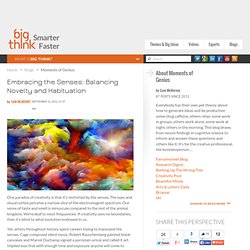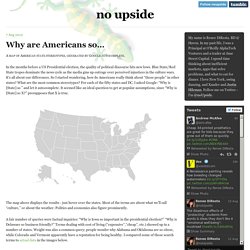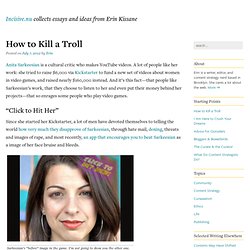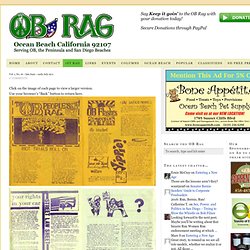

Embracing the Senses: Balancing Novelty and Habituation. One paradox of creativity is that it’s restricted by the senses.

The eyes and visual cortex perceive a narrow slice of the electromagnet spectrum. Our sense of taste and smell is minuscule compared to the rest of the animal kingdom. We’re deaf to most frequencies. If creativity sees no boundaries, then it’s blind to what evolution endowed in us. Yet, artists throughout history spent careers trying to transcend the senses. This assumption is not true. One takeaway from Pinker’s reminder is that if you are interested in delivering pleasure to a wide-range of people don’t look to modernists and postmodernists for inspiration. It’s worth wondering what inspired these artists to adopt an avant-garde attitude.
I don’t think this was the case for Cage et al. The need for novelty is built into the definition of being an artist, Martindale says, but the amount varies. StoryCorps. No upside – Renee DiResta. A map of American state stereotypes, generated by Google autocomplete.

In the months before a US Presidential election, the quality of political discourse hits new lows. Blue State/Red State tropes dominate the news cycle as the media gins up outrage over perceived injustices in the culture wars. It’s all about our differences. So I started wondering, how do Americans really think about “those people” in other states? What are the most common stereotypes? The map above displays the results - just hover over the states. A fair number of queries were factual inquiries: “Why is Iowa so important in the presidential election?”
The qualitative searches were most interesting to me. Boring. The single most common result of all was "boring,” which appeared for 18 states with no particular regional concentration. Chaos Star (Chaos Wheel, Chaosphere) "You should have your tongue ripped out": the reality of sexist abuse online. You always remember the first time someone calls you ugly on the internet.

I imagine -- although it hasn't happened to me -- you always remember the first time someone threatens to rape you, or kill you, or urinate on you. The sheer volume of sexist abuse thrown at female bloggers is the internet's festering sore: if you talk to any woman who writes online, the chances are she will instantly be able to reel off a greatest hits of insults. But it's very rarely spoken about, for both sound and unsound reasons. No one likes to look like a whiner -- particularly a woman writing in male-dominated fields such as politics, economics or computer games. Others are reluctant to give trolls the "satisfaction" of knowing they're emotionally affected by the abuse or are afraid of incurring more by speaking out. Both are understandable reasons but there's another, less convincing one: doesn't everyone get abuse on the internet?
Kate Smurthwaite Feminist activist and comedienne, author of Cruellablog. Bloomington.
Movies. Photography. Music. Music. Humor. Religious comics. Design. Notable. Comics. Social Action. How to Kill a Troll - Incisive.nu. Anita Sarkeesian is a cultural critic who makes YouTube videos.

A lot of people like her work: she tried to raise $6,000 via Kickstarter to fund a new set of videos about women in video games, and raised nearly $160,000 instead. And it’s this fact—that people like Sarkeesian’s work, that they choose to listen to her and even put their money behind her projects—that so enrages some people who play video games. “Click to Hit Her” Since she started her Kickstarter, a lot of men have devoted themselves to telling the world how very much they disapprove of Sarkeesian, through hate mail, doxing, threats and images of rape, and most recently, an app that encourages you to beat Sarkeesian as a image of her face bruise and bleeds.
Sarkeesian’s “before” image in the game. It’s nauseating. Why Did This Happen? Beyond that, I think most people find it difficult to hear criticisms of things they love. This essentialization of taste is pretty pervasive. How Do We Get Better? Non-Trolls Must Model Norms. Comedy Bang Bang: The Podcast episodes on Earwolf. Vol. 1, No. 16 – late June – early July 1971. Say Keep it goin' to the OB Rag with your donation today!

Secure Donations through PayPal OB Rag Grassroots and Progressive views on local, national and world news Vol. 1, No. 16 – late June – early July 1971 0 comments Click on the image of each page to view a larger version. . { 0 comments… add one now } Leave a Comment Sitemap | Contact | About Us | Comment Policy. Peta_ingridkills2.jpg (435×600)